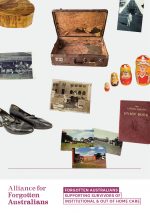The people who identify as Forgotten Australians are generally now 40 years of age and upwards. They are the survivors of the approximately 500,000 children who found themselves in institutional or other out-of-home care in the last century.
Abandonment and loss of family
All these children suffered from deep and lasting feelings of abandonment. The loss of family, often including separation from siblings, caused grief, feelings of isolation, guilt, self-blame and confusion about their identity.
Neglect and exploitation
The Senate report also revealed a history of neglect and cruelty by institutional staff and management, of abandonment and exploitation that have left at least half a million Australians, as well as many Former Child Migrants, physically and psychologically scarred. Physical deprivation was common. Children were cold and hungry. Hard physical work was part of their daily lives. Particularly demeaning and very difficult tasks were given as punishments.
Brutality
Punishments for very small offences or perceived disobedience could be harsh and cruel – severe physical attacks and beatings are reported by many. Alternatively, children were locked in a cupboard or a cell in solitary confinement or made to stand for many hours in one position. Bed-wetting was punished with beatings, cold showers and humiliations, e.g. parading naked past others.

